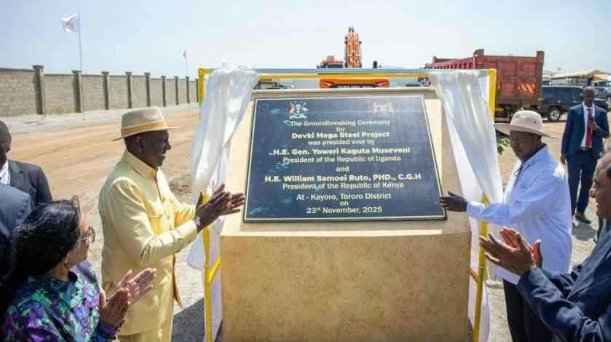Kenyan President William Ruto has reaffirmed his commitment to ensuring Uganda’s unhindered access to the Indian Ocean, using the launch of a major steel project in Tororo as a platform to strengthen regional cooperation and industrial growth.
Ruto was speaking on November 23 during the commissioning of the Vertically Integrated Steel Industry, an expansive plant set up by the Devki Group, owned by Kenyan investor Dr Narendra Raval. He described the facility as a landmark investment that reflects the region’s shared ambitions for industrial development.
Ruto hailed the new steel complex as more than an addition to Uganda’s manufacturing sector, calling it “a new chapter in Africa’s industrialisation journey.”
He attributed the project’s success to strong political will and cross-border collaboration, praising President Yoweri Museveni for consistently supporting large-scale investments that promote regional integration. Ruto noted that the two leaders previously discussed the importance of such projects during Museveni’s visit to Kenya in July.
He also acknowledged Rwandan President Paul Kagame for promoting closer ties within the East African Community (EAC), adding that the region’s prosperity would be built on cooperation rather than rivalry.
According to Ruto, Kenya views the Tororo steel plant as part of a broader strategy to align industrial development across the region. He emphasised that harmonised industrial policies, shared infrastructure, and coordinated value-addition initiatives are central to creating a competitive manufacturing base in East Africa.
The Tororo factory currently employs over 400 workers, with Devki Group projecting a workforce of up to 20,000 employees by 2027 across its regional operations.
Ruto said the plant’s output will not only enhance Uganda’s manufacturing capabilities but also support thousands of small and medium enterprises by increasing demand for transport, construction materials, energy services, and other supply chain activities.
Ruto cited Africa’s rapidly growing steel consumption—estimated at 39.5 million tonnes in 2024 and expected to rise to 52 million


